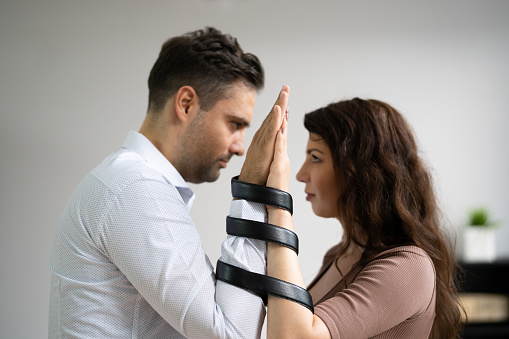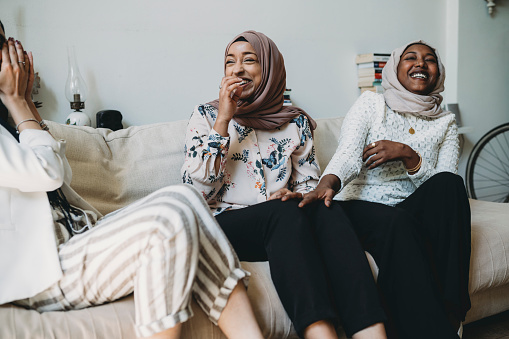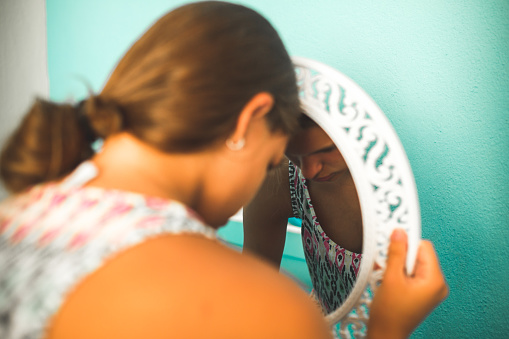
You might think that codependent relationships create a sense of security and togetherness, but that isn’t true. Codependent relationships lead to feelings of loneliness, disconnection, and rejection. This is because codependent relationships do not foster any sense of self-worth, self-confidence, or self-love. They create a system where autonomy, independence, and self-esteem cannot thrive. Codependency is tricky because it looks a lot like what we’re told love is supposed to look like: a can’t-live-without-each-other dynamic, a relationship that “completes us,” a unique understanding of another person. But in actuality, true fulfillment in relationships comes from the union of two people who love themselves and know that they can provide themselves with care.
3 Signs that you are in a Codependent Relationship
It is important to understand that codependent relationships can be built with anyone in our lives. While we typically think of romantic relationships, you are at risk of developing codependency in friendship, family relationships, and work. You may notice that you tend to experience more symptoms of codependency in specific dynamics or that they’re all relatively equal. Your unique circumstance will impact how codependency affects you.
Sign #1: You engage in people pleasing, where you put others’ needs first and your own needs last. You feel genuinely distressed if you feel that you are “letting someone down.”

Sign #2: You experience difficulty with open and firm communication, avoiding conflicts and/or disagreements. You are always accommodating because that is “easier” than expressing your needs and standing up for yourself.
Sign #3: You have difficulty setting boundaries: whether you are saying no, or asking for help. The people in your life can behave as they please toward you because you won’t tell them to stop.
5 Reasons Why You May Be Developing Codependent Relationships

1) There is a need for belonging:
We are wired for connection. We desire a sense of belonging that makes us feel contented, safe, and loved. This is a part of the human experience that cannot – and does not need – to be repressed or avoided. Being part of a community and feeling connected to other people is a need we have, like eating, breathing, and sleeping. The problem isn’t that we desire to be around other people (at varying amounts). The problem is that, at times and in certain contexts, this desire can play a role in developing codependent relationships.
If you find that you are more codependent in one aspect of your life than others, consider why that is. Do you lean into your romantic partnerships because you don’t feel like you have a solid friend group? Are you dependent on your friends because you have a disconnect from your family? If we feel that one area of our social life doesn’t satisfy us, it is tempting to pour more time and energy into the piece(s) we have. Worst of all, we tend to “chase” belonging; the least healthy of our connections can incite us to strive for approval. If our friend group can be kind of neglectful or leave us out of some invitations, we can fixate on wanting to please our friends. Their lack of approval becomes a challenge for us to overcome, as opposed to our sign that this person may not be the best fit for us. The idea of spending time with someone who accepts us as we are is nice, but we haven’t “earned it.” This kind of thinking can cause us to overlook stable and fulfilling relationships in all facets of our lives. It is important to refocus on our value system and ask ourselves why we are so desperate to maintain affection from someone who isn’t putting the same effort into us as we put into them.
Sometimes, we seek the emotional regulation of “fitting in” because we feel unsteady or insecure on our own. This may stem from feelings of low self-esteem, some of which may have been with us for a long time. We need everyone in our lives to validate and approve of us because we don’t feel that way about ourselves.
2) Deep down, you are feeling unworthy or unlovable:
When we don’t possess our own feelings of self-worth, we try to find them outside ourselves. The idea of being intertwined with others is appealing; they are there to comfort and support us, to compliment us, and to give us something to do and focus on. Sometimes, these relationships would be healthy if we were able to know and love ourselves properly, set boundaries, and enjoy them for the connections they were. Some of them, however, thrive on the fact that we rely on the other person for validation and morale. We don’t feel our best on our own, so we need the presence and affirmations of others to feel okay.
When you think about spending time alone, what do you think of? Are there hobbies or passions you can do by yourself that bring you happiness, energy, and relaxation? Do you feel that you have a

handle on your home life, the errands and chores of your household that make it feel safe and comfortable for you? When you think about yourself as a person, what do you think of? Would you be excited to meet you at a party? Do you think you have a lot to offer to another person? Do you feel that what you have to offer goes beyond acts of service? We all have times where we doubt ourselves, question our abilities, or just feel like we aren’t doing enough. If you constantly struggle with these feelings of inadequacy, you are in a prime position to develop codependent relationships. Some of this comes from life experiences where we were mistreated and/or neglected, and sometimes it is a lifelong battle.
Set aside time for self-love and self-reflection. Make a list of the things you like about yourself, what you’re good at, and what you care about. If your list is short, consider how you can expand it. If you can think of what you’re good at but not what you care about, seek clues there: are you good at certain things because you care about them? What about things you care about? Do they reflect aspects of your personality that are worth loving and celebrating?
3) You have early childhood attachment wounds:

What we mean here is that in our early years of life, as a child, we have a strong need for attachment to our caregivers. While this typically tends to be our biological parents, this need for attachment is true for any adult who has taken on the role of raising you.
Growing up, if your sense of attachment to your primary caregiver was inconsistent, unpredictable, or for some it was abusive, this causes disturbances in developing secure attachment and a secure sense of self. The common belief in psychology is that as a result of this childhood experience, you, as an adult, turn to other relationships to compensate. Your search for the love or safety you never got as a child, oftentimes over and over again. This can lead to situations where you are heavily attached to someone whose proximity soothes your attachment wounds, even if they don’t meet other criteria for you. You may also be seeking to heal your wounds by achieving a “successful relationship” with someone whose behavior mimics what you experienced in childhood; if you can get the person who is inconsistent to be consistent with you, you feel that it will validate who you are and that you are worthy of the attachment you have deserved all along.
Another way your childhood relationship shows up in your adult relationship is the belief that one reenacts relationships they are familiar with. For example, if you had a parent who was inconsistent in being there for you, then as an adult, having a friend or a partner who is also inconsistent becomes the norm. As an adult, you have codependent relationships because you are replicating what you saw growing up. We repeat patterns and seek familiarity in all aspects of our lives; interpersonal relationships are no different.
Please know that these are not blanket statements that will apply to everyone. We ask that you consider if and how these may apply to you. We don’t assume to know exactly what you have gone through. If you are struggling with childhood wounds, attending therapy might be a good way to explore what that means to you. Our therapy practice in Woodland Hills sees many people who are working on coming to terms with their past and healing attachment issues.
4) There is cultural pressure to be in a relationship:
When we talk about romantic relationships, we cannot ignore the impact of culture on our perception of their importance. The pressure to be married or in a relationship can make it harder to end one; we may feel we

need this person to have a complete and fulfilling life experience. This is especially true for anyone who was raised and socialized based on being assigned female at birth. How we speak to girls and women about the importance of finding a “soulmate” deeply impacts us. Juxtaposed with how our society seems to value women and the standards of perfection we are held to; this is a recipe for finding a partner and sticking with them because “partnership equals happiness, and you may never find someone else to love you again.” We are conditioned to subscribe to codependency as a marker of “true love” when in fact, the truth about codependency is that it is an unhealthy relationship dynamic that in no way indicates a successful relationship.
Another cultural pressure can be around loyalty and helpfulness. Across cultures, there is a shared value around being loyal to one another and being available and helpful to one another. As a result of this value that technically is kind and loving, it can cause people to overextend themselves in relationships. Feeling obligated to be there as “proof that you care” is exhausting and very common. If you feel that you cannot have boundaries and space for yourself without letting someone else down or compromising your relationship, that isn’t healthy, and it isn’t fair.
Remember that these parameters are set by other people, and you are the person in charge of your well-being. You are the voice in your head at the end of the day; you have to live with yourself 24/7. If our culture is telling you to behave in ways that don’t align with your needs, touch base with yourself about your priorities, standards, and goals. An overall idea cannot meet individual needs, and a lot of our societal norms were created for and by people who have nothing in common with us. Always revisit your inner self to determine what best serves you.
5) There are untreated mental health issues in your relationships:
While mental health issues and needs are complicated, and there is still so much stigma around mental health that we need to fight to end, it is also part of codependency. When there are untreated mental health issues in someone you love, whether they are suffering from depression, addiction, or disordered eating, this can unintentionally influence you to take on a more caregiving role that, over time, may become full-blown codependency.

This dynamic is easy to fall into; you feel that you are the more stable one, and the other person needs your help. You have the ability to caretake, and you love them, so it only feels natural. There are always times in relationships where one person is struggling in some way, and the other person can do a little more, but the key to a healthy relationship is balance. Do you get a turn to fall apart, be disorganized, be self-involved? How often are you the person keeping everything together?
Someone else’s mental health is not yours to heal, and it’s not the price you pay to have someone in your life who loves you. You are also not helping anyone by allowing them to avoid help and support for their struggles. There are resources out there for mental health needs; online support groups; therapy; books, e-books, podcasts; and more. Sometimes, the treatment for a mental health issue is as simple as a prescription for daily medication. You undoubtedly want the other person to feel well. The other person should also want that for themself. No amount of self-sacrifice, no amount of time “on call” for if they need you, no amount of you being there will make up for untreated mental health issues.
A healthy dynamic requires wanting to be around someone, not needing it. It requires us to invest in ourselves, fill our cups first, and possess our reserve of love and care. That is when real intimacy and understanding can flourish. Any time you feel obligated toward someone, or that you have been made responsible for their happiness, or that they are responsible for yours, you are doing your relationship a disservice. And you are doing yourself a disservice, as well.
Are You Struggling With Codependency?
Here at Embracing You Therapy Group, Therapy For Codependency can help you set boundaries and learn that your needs matter. We will unpack life experiences that have played a role in developing codependency and work with you in learning tools that will help you have better relationships with yourself and others to avoid being codependent. Contact us today for your complimentary 20-minute phone consultation with our Client Care Coordinator.




